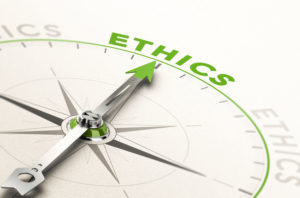Spinning the Moral Compass

When it comes to morality, it’s generally accepted that religious people are the most capable of doing good. Atheists, on the other hand, get the short end of the stick. We are assumed to be more capable of unethical behavior due to lack of religion. Why is this the opinion of most Americans? Are they missing something?
According to the Oxford Dictionary, morality is defined as “principles concerning the distinction between right and wrong or good and bad behavior.” The Stanford Encyclopedia of Philosophy states that morality refers to “certain codes of conduct put forward by a society or a group,” or “a code of conduct that, given specified conditions, would be put forward by all rational persons.” It’s important to note the distinction in the two definitions provided by the Stanford Encyclopedia—the first is applicable to smaller groups (i.e. religious), and the second is applicable to the collective understanding of our greater, global society.
A 2011 study of Americans’ views of morality as it pertains to certain social groups found that atheists are less trusted than theists. Even progressive, liberal participants distrusted atheists who were perceived as lacking a “moral compass” along with a specific text telling us right from wrong. More recent polls have shown that people are becoming more receptive to the idea that you don’t need religion to be a good person, however we still often hear Christians say that without God’s governance, the world would be a terrible place. It’s as if they’d otherwise take to the streets with a to-do list of vile behavior. Stealing, cheating, adultery, and murder—they’d go for it. But God is watching them, so they behave accordingly and trust that others who believe will do the same.
What about religions that have conflicting views on morality? Are they still trustworthy? For example, how does the Catholic Church reconcile its opposition to birth control with its members who largely support the use of contraception? Are they moral because of the rationale that birth control is a healthy and necessary practice, or are they immoral because they don’t follow what is defined in the doctrine? By now, birth control is an accepted and moral practice upheld by rational persons of our society. The same can be said for other religious/political taboos such as same-sex marriage and miscegenation, which were once illegal. Also known as theological incorrectness, this discrepancy in moral religiosity and traditional doctrine should reveal that there’s more to morals than a religious foundation. As seen over time, religiosity is adapted by favoring normative and rational ideals rather than original doctrine.
Religious morality is relative. It holds little to no weight in the foundation of what constitutes ethical behavior. The found just that—religion did not factor into good behavior. It revealed that religious people did not act any more ethical than atheists, even though religious people truly believed they were morally superior. This is the difference between religious people and atheists. To think that a belief makes you a good person is one thing. To act on that belief is another. Religion and morality are so often conflated that acting on those beliefs is sometimes forgotten. Simply associating yourself with a religion of good moral values does not make you a good person.
The religious might be morally inclined insofar as they are rewarded for such behavior, such as receiving their blessing back tenfold or achieving salvation and acceptance into God’s kingdom. Similarly, religious people might act morally during times of worship and then compromise their behavior at other times. In these cases, moral actions are based on fear and reward. They are taught to act on conditional morality rather than intrinsic virtue. Not because it is so, but because God said so. Nontheists can also act morally on conditions of fear and reward, but we generally do not claim ourselves to be morally superior.
Although atheists commit fewer crimes, religion in the United States is far too pervasive to overcome the cognitive dissonance this fact produces. Ironically, religion is a tool used to enforce morals that were already established. Thanks to evolutionary underpinnings, we developed ideas about what was good and bad as it pertained to the flourishing of our species. Morality was birthed from these biological intuitions, and as populations increased, we could no longer depend on smaller communities to govern moral standards. Religion solved this problem, proving to be a successful tool in policing large groups on what was moral and immoral. This goes to show that morality transcends religion as its point of origin. Our faculties are capable of deciphering good from evil, but our relationship with religion is such that we misattribute our moral foundations to the divine.
